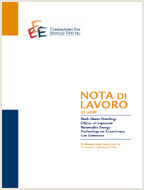Carbon Abatement Leaders and Laggards Non Parametric Analyses of Policy Oriented Kuznets Curves

22.10.2010
Massimiliano Mazzanti, Antonio Musolesi
C14, C22, C23, Q53
Carbon Kuznets Curves, Kyoto, Long Run Dynamics, Policy Events, Heterogeneous Panels, Cross-Section Correlation, Semi Parametric Models, Common Time Trends
Climate Change and Sustainable Development
Carlo Carraro
We study the eventual structural differences of climate change leading ‘actors’ such as Northern EU countries, and ‘lagging actors’ – southern EU countries and the ‘Umbrella group’ – with regard to long run (1960-2001) carbon-income relationships. Parametric and semi parametric panel models show that the groups of countries that were in the Kyoto arena less in favour of stringent climate policy, have yet to experience a turning point, though they at least show relative delinking in their monotonic carbon-income relationship. Northern EU instead robustly shows bell shapes across models, which seem to depend on time related (policy) events. Time related effects are more relevant than income effects in explaining the occurrence of robust Kuznets curves. The reaction of northern EU to exogenous policy events such as the 1992 climate change convention that gave earth to the Kyoto era, and even the second oil shock that preceded it in the 80’s are among the causes of the observed structural differences.
